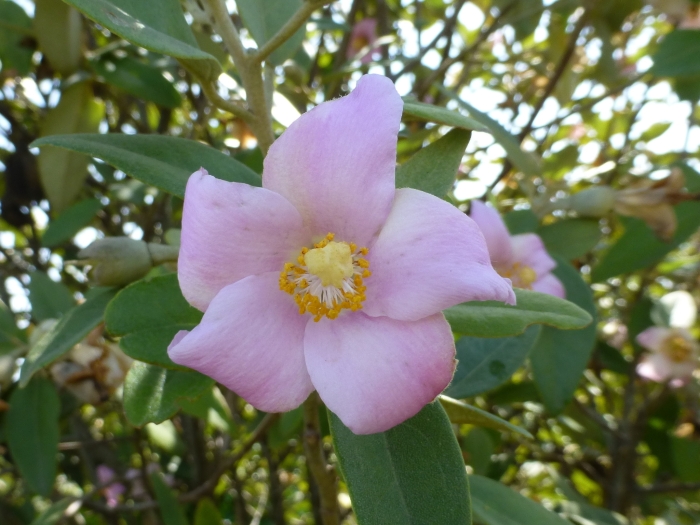Cow Itch Tree
(Lagunaria patersonii)
Cow Itch Tree (Lagunaria patersonii)
/
/

© Murray NZ
CC BY 4.0
Image By:
© Murray NZ
Recorded By:
Copyright:
CC BY 4.0
Copyright Notice:
Photo by: © Murray NZ | License Type: CC BY 4.0 | License URL: http://creativecommons.org/licenses/by/4.0/ | Uploader: murray_dawson | Publisher: iNaturalist |










































Estimated Native Range
Summary
Lagunaria patersonii, commonly known as Cow Itch Tree, is an evergreen tree native to Norfolk Island, Lord Howe Island, and parts of coastal eastern Australia. It typically grows to a height of 20 meters and a diameter of 1.5 meters. The tree is characterized by its pyramidal shape when young, becoming more rounded with age. It produces showy pink and white hibiscus-like flowers during the summer and fall, which are followed by seed pods containing irritating hairs, hence the common name. The bark is smooth and gray, providing additional visual interest.
Lagunaria patersonii is valued for its ornamental flowers and is used in a variety of landscaping applications, including as a specimen tree, in coastal gardens, and for street or park plantings. It serves effectively as a windbreak and is tolerant of salt spray, making it suitable for seaside environments. This species thrives in full sun and requires well-drained soil, but it is notably hardy, tolerating poor, dry soils, wind, and light frosts. Propagation is typically done by semi-ripe cuttings in the summer. Gardeners should be cautious, as Lagunaria patersonii can become invasive outside its native range. It is important to consult local regulations before planting to prevent ecological disruptions.CC BY-SA 4.0
Lagunaria patersonii is valued for its ornamental flowers and is used in a variety of landscaping applications, including as a specimen tree, in coastal gardens, and for street or park plantings. It serves effectively as a windbreak and is tolerant of salt spray, making it suitable for seaside environments. This species thrives in full sun and requires well-drained soil, but it is notably hardy, tolerating poor, dry soils, wind, and light frosts. Propagation is typically done by semi-ripe cuttings in the summer. Gardeners should be cautious, as Lagunaria patersonii can become invasive outside its native range. It is important to consult local regulations before planting to prevent ecological disruptions.CC BY-SA 4.0
Plant Description
- Plant Type: Shrub, Tree
- Height: 15-30 feet
- Width: 12-16 feet
- Growth Rate: Moderate
- Flower Color: Pink, White
- Flowering Season: Summer, Fall
- Leaf Retention: Evergreen
Growth Requirements
- Sun: Full Sun
- Water: Low
- Drainage: Medium
Common Uses
Drought Tolerant, Low Maintenance, Showy Flowers, Street Planting
Natural Habitat
Native to Norfolk Island, Lord Howe Island, and parts of coastal eastern Australia
Other Names
Common Names: Norfolk Island Hibiscus, Primrose Tree
Scientific Names: , Lagunaria patersonia, Lagunaria patersonii, Hibiscus patersonii, Lagunaria patersonia subsp. patersonia, Laguna squamea, Laguna patersonia, Hibiscus patersonius, Lagunaea patersonia, Lagunaria patersonia var. patersonia
GBIF Accepted Name: Lagunaria patersonii (R.Br.) G.Don